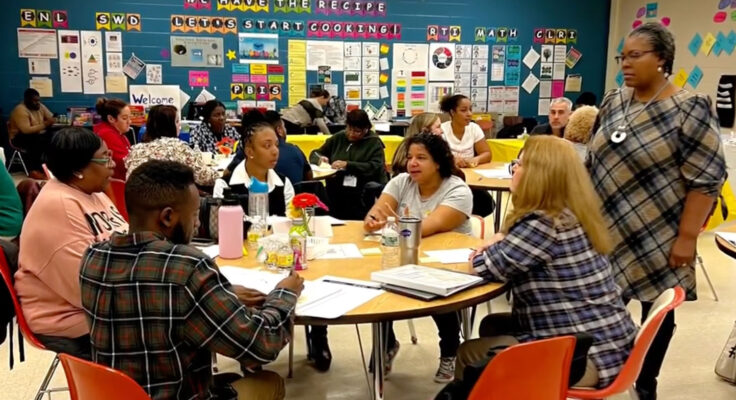Among the most powerful characteristics a leader can possess are humility and a willingness to learn. When Teneh Weller speaks about her work as founder and executive director of High Expectations, these qualities resound throughout her reflections. It’s clear that they anchor and strengthen her work with families in the context of their children’s educational journeys. And what could possibly be more effective when supporting others’ learning than the personal experience of being in a similar situation?
When Weller, a Black woman from Oakland, was early in her career, working as a classroom teacher, she found herself struggling to engage families of color. “I prepared my speech for back-to-school night my first year, about my hopes and dreams for kids, and I could not figure out why I was getting pushback from families.” She knows now that it was because she told families what she wanted for their children without asking about their vision. “I made a lot of assumptions about the community I was going into,” she says. Determined to improve her relationships with families, she shifted her approach. She started doing home visits and listening to families. “I was blessed with a group of families who were really honest with me and willing to help me grow.”
The Power Of Intentional Partnership
Guided by her listening orientation, Teneh deepened relationships with families. “I created workshops with the families in my classroom to give them tools and resources and learn about who they are.” This last part was the key. By learning more about her students’ families, Teneh could create a classroom environment that supported families’ hopes for their children.
Family input guided her practices. “Families would say, ‘You’re sending homework we don’t understand or know how to apply,’ so I started sending homework that students could do independently. We shifted to build on families’ strengths.” This resulted in higher student achievement.
She realized that the shifts in practice that were taking place in her classroom could be of help to other classrooms. After a decade of hands-on implementation, Teneh had a series of workshops for families that had been tested and refined and that she knew could benefit other schools.

“Our first approach to equity was dual capacity building—making sure that we were supporting teachers as we were supporting families, and holding families as accountable as we were holding teachers.”
Teneh Weller
Supporting Holistic Achievement For Students
Just like Teneh’s early classroom practices, High Expectations’ work is oriented around listening and learning. “Our first approach to equity was dual capacity building—making sure that we were supporting teachers as we were supporting families, and holding families as accountable as we were holding teachers,” she shares. This early approach is at the heart of High Expectations’ approach and ongoing success in helping families and school staff (with an emphasis on teachers) find ways to partner to support holistic achievement for students. High Expectations focuses on relationship building and creating a school climate and culture where all families feel welcomed and valued. In assessing its own impact, they look for increases in reading scores and for deeper connections between home and school.
“We’re building the capacity of anyone who is responsible for caring for children,” Teneh says. High Expectations offers families workshops that support increased confidence in their own leadership. “We believe that families are leaders; they just don’t always realize it.” Once families identify as leaders, they can leverage their leadership skills to extend their impact to the entire school or district. “There’s just something about giving families the space and support that gives them this opportunity to shine.”
“There’s just something about giving families the space and support that gives them this opportunity to shine.”
Teneh Weller
Creating Conditions For Progress
High Expectations develops standalone resources that schools and families can easily access to strengthen their partnership. For example, families are introduced to tools that help them communicate and partner with their child’s teachers. “What makes High Expectations unique is our attention to capacity building and tools and resources tailored to each school. This type of capacity building creates conditions for progress.”
High Expectations holds space where people feel safe expressing themselves—even when what they are expressing is problematic. “Sometimes I hear things that make me angry,” Teneh says. “But I’ve learned to respond with capacity building, which has created safe spaces for teachers to say things, even if it’s, ‘Those families don’t care about their kids.’ If teachers don’t say that, then we can’t support them by illuminating the research and creating a situation where they can be proven wrong.”
Using Data As A Means For Achieving Equity
The first step in High Expectations’ work is to form a family engagement team, comprised of families, two or three teachers, the principal and the family liaison, the main contact for families at the school. This team comes together for a two-day institute to look at data and build an informed and mutually agreed-upon plan for moving forward.
High Expectations uses data to drive more support, resources and power to families, especially to families whose experiences with schools have been inadequate and harmful. Even when schools have high levels of family engagement, that doesn’t mean they are engaging a representative sample of their school community. “Are we really listening to African American or Arabic families,” Teneh probes. “Are the families you’re looking to engage and share decision-making power with reflective of your community and of your data?”
“Are the families you’re looking to engage and share decision making power with reflective of your community and of your data?”
Teneh Weller
Early in the COVID-19 pandemic—when teachers and school staff were particularly overworked and overwhelmed—Teneh was working with a new elementary school leader in Oakland who wanted to do better at engaging families. In the first phase of work with High Expectations, school leadership heard concerns from families about literacy levels. That next year, they launched a family literacy team, which led to the new school leader establishing clear and consistent expectations around reading and literacy. The families—motivated by concerns about inequities in data on outcomes—organized and distributed books to all 650 students in the school. Before High Expectations came in, 30 students participated in their reading challenge. After the families got involved, half of the school’s 650 students participated.
High Expectations positions families as co-creators of their children’s education and planning for students happens as a team. Weller says, “When we review the child’s test scores, we decide with families what we do about it.” This approach exemplifies High Expectations’ philosophy of decision-making with families, not for them.

